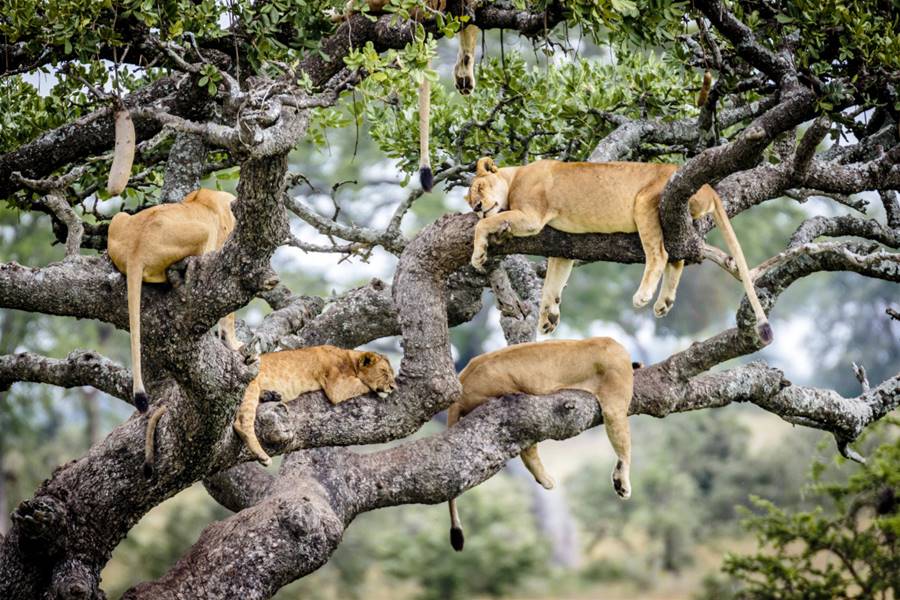

Do you know if lions are nocturnal or diurnal? Some people might say that they’re nocturnal. However, lions often hunt during both day and night. So, what’s the answer? Are lions nocturnal or diurnal animals? The answer depends on several factors. Lions can be diurnal and nocturnal, depending on their environment and habits. Let’s explore what this means for their sleep behavior.
Lion Species
Barbary or Atlas Lion
Lions are predators, so they adapt their hunting to prey availability in their environments.
Most people think of lions as majestic creatures roaming the African savanna. However, the wild lion population also exists on several other continents. Nearly all wild lions live on the African continent, with the majority inhabiting the sub-Saharan region. However, a small population of Asiatic lions exists in western India, around the Gir Forest National Park.
16,885 People Couldn't Ace This Quiz
Think You Can?
Interestingly, these Asiatic lions are more closely related to those found in west and central Africa than the African lions living in southern and eastern Africa.
Regardless of their location or subspecies status, all wild lion populations face significant threats to their survival. Most of these threats come from habitat loss, poaching, and other human activities.
Yet, articles like this one are helpful. They support continued conservation efforts and education about lion populations around the globe. With every piece of information, these extraordinary animals stand a better chance of continuing to exist for generations to come.
The Amount of Time Lions Sleep
Lions are renowned for their ferocity and unrivaled hunting skills.
Still, it may surprise many people to learn how much time these majestic predators sleep. According to scientific research, male lions typically sleep for 18 to 20 hours daily. In contrast, female lions usually get around 15 to 18 hours of shut-eye daily. There are a few possible explanations for this difference in sleep patterns between male and female lions. For one thing, the lionesses tend to do more hunting and caring for cubs, and these activities mean they have less time to rest.
Also, studies show that lions sleep more after eating a large meal. Some individuals even sleep up to 24 hours following such a feast.
Whatever the reasons for the differences in sleep patterns between males and females, it is clear that even these fearsome predators need plenty of rest when they’re not on the hunt.
Factors Influencing a Lion’s Sleep Habits
The Big Five
Some lions prefer sleeping in elevated areas with good views
When it comes to lions and their sleep habits, the answer is not clear-cut. While many people might assume that these fierce predators are strictly nocturnal animals, with most of their activity occurring at night, the reality is more complex.
It all depends on the environmental factors influencing a lion’s daily life.
Lions are known to be highly adaptable creatures and will shift their sleeping behavior in response to changes in their environments. For example, suppose a pride of lions finds itself in an area with limited hunting opportunities at night. In that case, they will often transition into a diurnal state.
This transition could be because, during warmer months, some prey species spend more time foraging during the cooler periods of the day. In that case, the lions will spend more time hunting in the early evening and morning and sleep more during the day’s heat.
So, they will change their hunting behavior based on prey availability during their hunting or foraging periods.
Similarly, suppose a pride lives in a particular territory that poses high risks for them at night, such as when humans or other predators pose threats. In that case, lions may limit dangerous nocturnal activities in favor of resting safely through the dark hours.
Whatever specific times of day lions choose for rest or hunting, one thing remains. To survive in their environment, these big cats must be masters of adaptation. As masters, they are flexible enough to change their daily habits accordingly.
Ultimately, while lions may exhibit nocturnal behavior much of the time, they are essentially opportunistic more than anything else.
want read more may check web"a-z-animals" by anet F. Murray you can see the whole infor.
